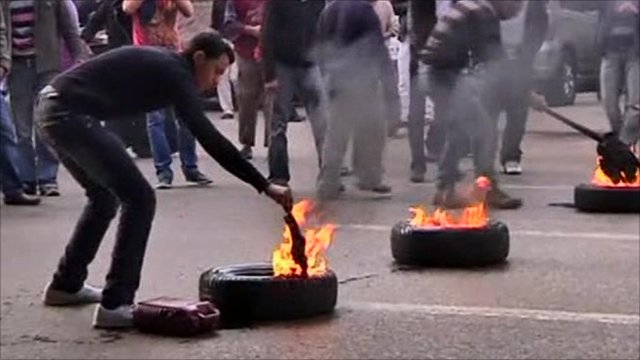 About 700 people have been arrested throughout Egypt in a crackdown against anti-government protests, security officials say.
About 700 people have been arrested throughout Egypt in a crackdown against anti-government protests, security officials say.
The arrests came as police clashed with protesters in two cities following Tuesday's unprecedented protests.
Police broke up demonstrations in central Cairo, beating protesters, and in Suez parts of a government building were reportedly set on fire.
Public gatherings would no longer be tolerated, the interior ministry said.
Anyone taking to the streets against the government would be prosecuted, it added.
The BBC's John Leyne in Cairo says the authorities are responding in familiar fashion, treating a political crisis as a security threat.
Prime Minister Ahmed Nazif was quoted as saying the government was committed to "freedom of expression by legitimate means", state news agency Mena reported. Police had acted with restraint, he said.
However, Washington has called on the Egyptian government to lift its ban on demonstrations.
Protesters have been inspired by the recent uprising in Tunisia, vowing to stay on the streets until the government falls.
They have been using social networking sites to call for fresh demonstrations, but both Facebook and microblogging site Twitter appear to have been periodically blocked inside Egypt.
The government denied it was blocking the sites.
Cabinet spokesman Magdy Rady said it respected freedom of expression and "would not resort to such methods", Reuters news agency reported.
In other developments:
Egyptian Trade Minister Rachid Mohamed Rachid cancels his visit to the World Economic Forum in Davos, Switzerland
Activists have called on protesters to observe "Anger Friday", by going to rallies after praying in mosques and churches
In the northern city of Machala, police have cordoned off the headquarters of the Democratic Front opposition party, which is threatening a hunger strike
Hundreds have been arrested in Alexandria, activists say, as police prevent organised rallies
Stone-throwing
Following a "day of revolt" across Egypt on Tuesday, in which four people died, protesters attempted to stage new demonstrations in Cairo on Wednesday.
There were scuffles outside the journalists' union building in central Cairo as hundreds of people gathered to protest.
Police beat some with batons and fired tear gas when they tried to break through a cordon.
Protesters burned tyres and threw stones at police.
Reuters news agency reported more clashes outside a central court complex in the city.
Witnesses said riot police had been charging demonstrators throughout the day wherever in Cairo they happened to gather.
Meanwhile, in the eastern city of Suez, protesters threw petrol bombs at a government building, setting parts of it on fire, witnesses said.
The headquarters of the ruling National Democratic Party in the city was also attacked.
Earlier, protests were held outside the morgue where the body of a victim of Tuesday's protests was being kept. At least 55 people were injured in the city.
One of Tuesday's demonstrators, Mostapha al-Shafey, told the BBC he planned to join protests again on Wednesday.
"I want to see an end to this dictatorship. Thirty years of Mubarak is enough. We've had enough of the state of emergency. Prices are going up and up," he said.
Demonstrations are illegal in Egypt, which has been ruled by President Mubarak since 1981. The government tolerates little dissent and opposition demonstrations are routinely outlawed.
Social media's role
Tuesday's protests were co-ordinated through a Facebook page, where organisers say they are taking a stand against torture, poverty, corruption and unemployment. One page called for protesters all over Egypt to gather after prayers on Friday.
However, Wednesday brought reports that Facebook was being blocked inside Egypt.
Twitter also played a key part, with supporters inside and outside Egypt using the search term #jan25 to post news on Tuesday, but it was blocked later in the day.
BBC technology correspondent Mark Gregory said that while this clampdown had undoubtedly restricted access to information, technically minded protesters had found ways of evading the restrictions.
Many have stayed in touch by routing their messages through proxy servers - web facilities based in other countries.
The government blamed the violence on the banned Islamist movement the Muslim Brotherhood, although this group was reported to have been ambivalent about the protests.
One opposition leader, Mohamed ElBaradei, had called on Egyptians to take part in the protests.
US Secretary of State Hillary Clinton said: "We urge the Egyptian authorities not to prevent peaceful protests or block communications including on social media sites.
"We believe strongly that the Egyptian government has an important opportunity at this moment in time to implement political, economic and social reforms to respond to the legitimate needs and interests of the Egyptian people."
Tunisia's President Zine al-Abidine Ben Ali was ousted from power and fled the country earlier this month, after weeks of protests in which dozens of people were killed.
Egypt has many of the same social and political problems that brought about the unrest in Tunisia - rising food prices, high unemployment and anger at official corruption.
However, the population of Egypt has a much lower level of education than Tunisia. Illiteracy is high and internet penetration is low.
There are deep frustrations in Egyptian society, our Cairo correspondent says, adding that Egypt is widely seen to have lost power, status and prestige in the three decades of President Mubarak's rule.



